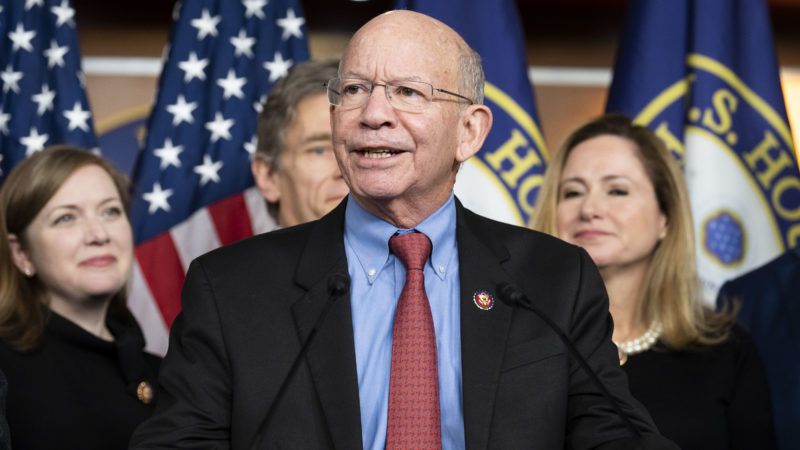House Democrats' $500 Billion Transportation Overhaul Would Require Doubling the Federal Gas Tax
Senate Republicans have proposed a far more modest reauthorization of federal surface transportation spending programs that are set to expire in September.

House Democrats are out with a new bill that would reauthorize the federal government's soon-to-expire surface transportation programs. Their proposal would boost current spending levels, devote a lot more money toward transit and passenger rail, and require a huge gas tax hike to pay for everything.
Last week, Rep. Peter DeFazio (D–Ore.), who chairs the House Committee on Transportation and Infrastructure, released the Investing in a New Vision for the Environment and Surface Transportation (INVEST) in America Act. The legislation would devote $494 billion over the next five years to the Highway Trust Fund, the main federal spending program for highways and public transit, and other grant programs.
"The bulk of our nation's infrastructure is not only badly outdated," said DeFazio in a press release. "The INVEST in America Act is our opportunity to replace the outdated systems of the past with smarter, safer, more resilient infrastructure."
A little more than $410 billion, would be devoted to the federal government's Highway Trust Fund. That's a 46 percent boost from the last surface transportation bill, according to a committee summary of the legislation. It's also much more than generous than the surface transportation bill proposed by Senate Republicans last year. That bill, introduced by Sen. John Barrasso (R–Wy.) would spend $287 billion over five years, $259 billion of which would be directed toward roads and bridges.
Those proposed levels of spending make DeFazio's proposal unlikely to get much traction, says Baruch Feigenbaum, a transportation expert with the Reason Foundation (the nonprofit which publishes this website).
"It's never going to pass," he says. "The primary reason for that is the amount of spending would require doubling the federal gas tax and that's never going to happen."
The federal gas tax hasn't fully funded the Highway Trust Fund since 2008. In that time, Congress has had to transfer $144 billion from the Treasury's general fund and other sources to cover the gap, according to an April report from the Congressional Research Service.
The federal gas tax collected $36 billion in revenue in 2018, according to the Tax Foundation, an independent tax policy nonprofit. With vehicle miles traveled going off a cliff during the coronavirus pandemic, gas tax revenue is going to be even tighter.
In the past, both President Donald Trump and business lobby groups like the Chamber of Commerce have endorsed boosting the gas tax. Doing so now, in the midst of a severe economic slump, is unlikely, says Feigenbaum, calling DeFazio's bill more of a "messaging exercise" than anything else.
To that end, it includes a lot of money for Democratic priorities.
Spending on rail would get a big boost under this bill. The last surface transportation bill carved out $10.3 billion for passenger rail funding, with most of this going to the federally owned and operated Amtrak service.
The INVEST in American would spend close to $30 billion on Amtrak alone, and create a new $19 billion grant program for expanding intercity passenger rail. The bill also includes language that would force the Department of Transportation to re-obligate high-speed rail funds to their intended recipients. The Trump administration had stripped federal funding from California's disastrous high-speed rail project back in 2019.
While both highway and transit spending would see an increase in the bill, transit's share of surface transportation spending would increase more in DeFazio's bill. Language in the bill would also allow more flexibility for highway funds to be spent on transit, says Feigenbaum.
The bill would require states and localities to factor climate change impact into their transportation planning, and includes grant money for emissions reduction programs and climate change research.
The climate change provisions have been greeted with a chilly reception from both industry groups and congressional Republicans, according to Politico. Most are lining up behind Borrasso's more modest Senate proposal bill.
Congress's current surface transportation programs are mostly set to expire at the end of September. Feigenbaum says that 2020 being an election year probably means that Congress probably won't pass a long-term transportation reauthorization bill this year, and will instead pass a short-term extension until 2021.
Rent Free is a weekly newsletter from Christian Britschgi on urbanism and the fight for less regulation, more housing, more property rights, and more freedom in America's cities.


Show Comments (60)